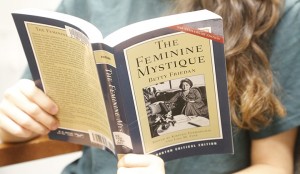
Robby Hirst | Lariat Photographer
Reporter
This week, Baylor will recognize the 50th anniversary of “The Feminine Mystique,” a 1963 book by Betty Friedan that sparked another wave of feminism.
Baylor faculty will join Dr. Angela Barron McBride, professor and university dean emerita of Indiana University School of Nursing, to recognize the book’s anniversary at 12:30 p.m. Friday in the Jesse H. Jones Library. The symposium will discuss feminism and its current application to education, work, faith and society.
The creation of the bi-annual symposium was inspired by the desire to highlight Baylor research and provide exposure to a book that has had a significant impact on our society, said Ellen Filgo, E-learning Librarian.
“‘The Feminine Mystique’ launched a revolution,” Filgo said.
Dr. Leslie Hahner, assistant professor in communication studies and a feminist scholar, will present her studies at the symposium.
Hahner said she was raised by a feminist and has read the Feminine Mystique many times since high school.
“The Feminine Mystique diagnosed something women were feeling but could not articulate,” she said.
This problem studied by Friedan was the discontent housewives were feeling in the 50s, which she called “the problem that has no name.”
Many women were educated and had ambitions, but they did not feel like they had options.
Some wonder why this is relevant today since many women are not confined to the household and have opportunities to work.
Dr. Hope Koch, associate professor in the information systems program, will address contemporary women’s feelings of discontent and how to balance work and family.
Koch will tie in the contemporary novel “Lean In” by Sheryl Sandberg, chief operating officer of Facebook.
“This book changed my life,” she said. “Even some of my students have said this booked changed their life.”
Koch said the book is about how women hold themselves back from accomplishments in the corporate world and often feel like the success they have is undeserved.
“Women only do things we know how to do,” she said.
Koch’s goal is to empower women.
“I want to retrain their vision of what they can do,” she said.
Another contemporary twist to the topic will be delivered by Dr. Mia Moody-Ramirez, associate professor in the journalism department.
Moody-Ramirez will present on the representation of “The Feminine Mystique” on the web by looking at Pinterest pins.
Her research uncovered Pinterest links to blogs, art and criticism on the book. She said she found a pin that debunked myths about the book.
“For example, one of the myths about the book was ‘Friedan hated men,’” she said. “The truth is she was actually a flirt.”
Moody-Ramirez said people often assume the book encourages women to forsake family life, but that is not true.
“She was enlightening women,” Moody-Ramirez said. “She was showing there was more out there if they were unfulfilled.”
Moody-Ramirez said social media is a platform to discuss these ideas and expose this book to a new generation of woman.
“The fact that people are still blogging and writing about the topic 50 years later demonstrates that it has had a lasting impact on society,” she said.
“The Feminine Mystique” inspired the second wave of feminism, Hahner said.
“The first wave was the right of suffrage, right to divorce and right to a bank account,” she said. “The second wave was a right to consciousness. They wanted to identify and fight against gender stereotypes.”
Hahner said one of the limitations of the research was that Friedan was only looking at other white suburban housewives. Friedan was, herself, a white suburban wife and mother.
“What about women who worked? Women of color?” Hahner said.
Despite her limited population, Hahner’s book changed the consciousness of the world, according to Amazon.
“It took her over 10 years to write but she was impactful immediately,” Hahner said.
Filgo said Friedan’s novel paved the way for women’s rights today which women did not have 50 years ago.
“For example, Title 9, which provides equality for women in sports,” she said.



